Pep is a very precious commodity, especially in fast-paced modern America. If you're thirsty for a quick pick-me-up, you can get a lift from healthy drinks like green tea or black coffee. If you want something even stronger, you can reach for one of the many colorful, canned energy drinks now crowding your grocer's cooler, from the ubiquitous Red Bull, which comes loaded with energy-boosting caffeine, taurine, and sugar, to newer better-for-you brands, like the low-calorie, vitamin-packed Celsius.
Demand for energy drinks has soared in recent years. According to Statista, nearly one-third of Americans aged 18 to 49 consume the highly caffeinated carbonated beverages, with U.S. sales climbing from about $11 billion in 2017 to around $18.5 billion in 2023.
Any number of these vibrantly labeled concoctions can provide you with ample stimulation to power through your day, but are any of them actually enjoyable to drink?
I recently sampled seven of America's top-selling energy drink brands to find the best option based purely on taste. For this survey, I chose one of the most popular flavors from each brand for comparison. The results, much like the effects of these drinks, were eye-opening.
Here's how each brand ranked in descending order from my least favorite to the overall best.
Prime Tropical Punch
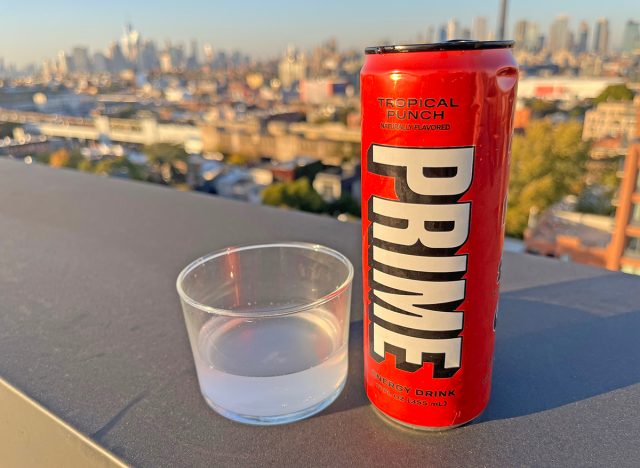
Calories: 10
Fat: 0 g
Sodium: 55 mg
Carbs: 3 g (Fiber: 0 g, Sugar: 0 g)
Protein: 0 g
One of the newer brands on store shelves, Prime has quickly become a household name, thanks to its influencer-founders Logan Paul and Olajide "KSI" Olatunji, who've capitalized on their social media status to create a booming beverage juggernaut. Though it started out as a line of hydrating sports drinks, the brand expanded into energy drinks in 2023.
Prime offers eight different energizing flavors, including the popular Tropical Punch, which packs 200 milligrams of caffeine and 300 milligrams of electrolytes into each slender 12-ounce can. I grabbed one from my local grocer for
The look: Surprisingly somber. Given the cherry red packaging, I was expecting something more flushed like the classic Hawaiian Punch, but this drink came out cloudy like coconut water. Turns out, that's because it's actually made with coconut water concentrate (the second listed ingredient after carbonated water).
The taste: Shockingly tannic. The first sip hit with a strong, astringent kick that tingled on the tongue. Once the sensation faded, a swirling melange of tangy, tart, and sweet flavors took over. Like many newer energy drinks, Prime is flavored with the artificial sweetener sucralose, which substantially lowers the calorie count but also gives the drink a synthetic quality that is more noticeable in some drinks than others. Prime tasted the most unnatural to me, which is why I ranked it dead last.
Ghost Sour Patch Kids Redberry
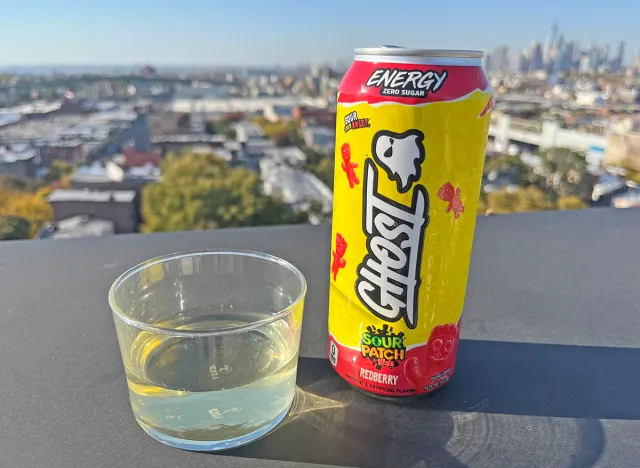
Calories: 5
Fat: 0 g
Sodium: 35 mg
Carbs: 1 g (Fiber: 0 g, Sugar: 0 g)
Protein: 0 g
If you've got a sweet tooth, Ghost is probably the energy drink brand for you. Backed by beverage giant Anheuser-Busch, the label produces a wide range of flavors in partnership with numerous well-known candies including Warheads and Swedish Fish. Its Sour Patch Kids Redberry flavor is perhaps the most popular.
Each 16-ounce can contains a full 200 milligrams of caffeine and a whopping 1,000 milligrams of taurine, along with moderate doses of ginseng and a range of B vitamins. I grabbed one from a local grocer for $3.49.
The look: Golden and effervescent like a sparkling white wine. You could call it "the Champagne of energy drinks," if you wanted to sound fancy, but it's probably more akin to the bargain-brand bubbly that you find at your local pharmacy.
The taste: Tart and syrupy. The first sip was all sour lime before a strong sweetness took over. The lingering flavor reminded me of an old-school cherry-flavored freezer pop—specifically, the sugary dregs that collect at the bottom of the plastic pouch after the rest of the popsicle is gone. Like Prime, Ghost is a sugarless product made with sucralose and suffers from the same sort of phoniness. It's also the most cloyingly sweet of all the drinks in this survey.
Red Bull
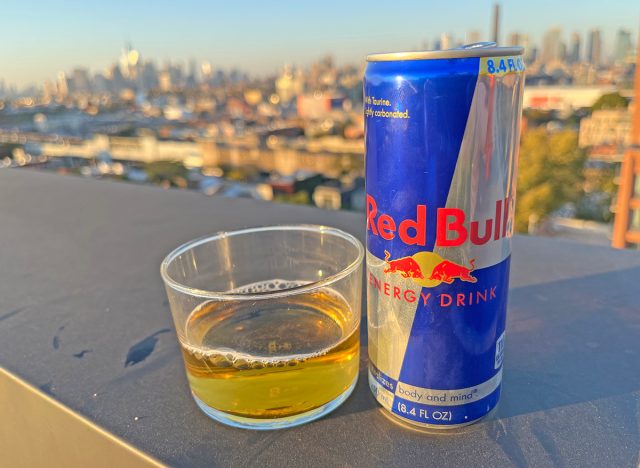
Calories: 110
Fat: 0 g
Sodium: 105 mg
Carbs: 29 g (Fiber: 0 g, Sugar: 27 g)
Protein: 0 g
Though nowadays you can find entire store refrigerator cases full of different energy drinks, it all started with just one. Red Bull effectively invented the category. The Austrian product first launched in the United States back in 1996 and still stands alone as the top-seller overall, reporting over $7 billion in U.S. sales last year, according to Statista.
Sugar-free and various seasonal flavors are available, but the original formularemains a classic. Made with real sugar, the standard-bearer packs more calories than many other energy drinks, yet delivers one of the lowest doses of caffeine at just 80 milligrams per 8.4-ounce can. I grabbed mine from a local supermarket for $2.
The look: Amber-colored like honey with a moderate amount of bubbles, it's the sort of liquid that looks much the same going in as it does coming out, for better or worse.
The taste: Syrupy sweet and vaguely medicinal with a none-too-subtle metallic aftertaste. It's hard to compare to anything else because Red Bull is its own thing. If you were of legal drinking age back in the early 2000s, you probably mixed it with vodka, a popular combo served at nightspots during that time. Without the added booze, it now tastes very unbalanced. As distinctive as the flavor is, you can find many other options today that deliver the same jolt but without feeling like you just licked a steely light pole.
Original Green Monster Energy
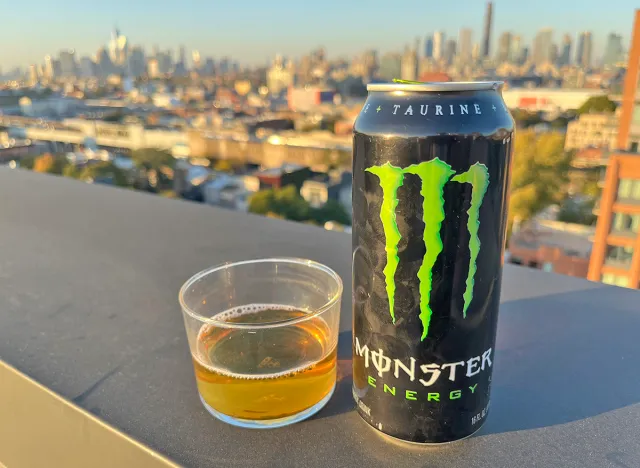
Calories: 230
Fat: 0 g
Sodium: 370 mg
Carbs: 58 g (Fiber: 0 g, Sugar: 54 g)
Protein: 0 g
With Red Bull's rising popularity around the turn of the century, imitators were sure to follow. Launched in 2002, Monster Energy amplified what consumers loved about the original energy drink by offering even more caffeine in a bigger 16-ounce can. Now the second-biggest brand after Red Bull, Monster comes in a range of flavors, including White Pineapple and Peaches N' Cream. Yet, its OG flavor in the black can with green lettering remains a popular choice.
Each tallboy can contains 160 milligrams of caffeine and a colossal 54 grams of sugar, in addition to hefty doses of B vitamins. I got mine from a local supermarket for $2.50.
The look: Slightly foamy and yellow-brown like a light beer. It's a shade or two darker than its rival Red Bull, which only seems fitting given the one-upsmanship that fueled Monster's ascent.
The taste: Sugary and acidic. The flavor was not entirely dissimilar to Red Bull, but much sweeter and smoother—more like candy and less like cough medicine. I enjoyed this drink much more than I expected—though, to be fair, consuming anything so overloaded with sugar is inevitably bound to boost your mood, if only in the short run.
C4 Frozen Bombsicle
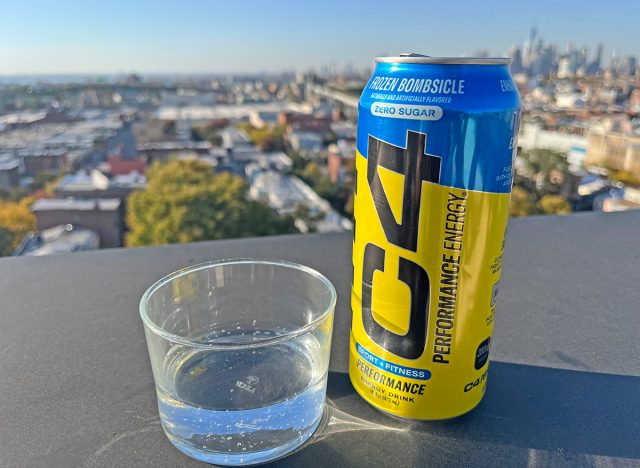
Calories: 5
Fat: 0 g
Sodium: 55 mg
Carbs: 0 g (Sugar: 0 g)
Protein: 0 g
Marketed primarily as a sport and fitness product, C4 is one of today's fastest-growing energy drink brands, offering an array of flavors containing zero sugar, zero carbs, and barely any calories. The Frozen Bombsicle flavor is a standout. In addition to 200 milligrams of caffeine, the drink is infused with beta-alanine, the popular endurance-boosting fitness supplement. I picked up a 16-ounce can at the local supermarket for $3.99.
The look: Crystal clear and bubbly like a glass of sparkling water. The clean look seemed in keeping with the brand's professed clean-living ethos.
The taste: Like liquefied Sweet Tarts candies, with hints of raspberry, cherry, and lemon. Though flavorful, the sweetness felt somewhat muted, making for a refreshing, lightly fizzy sip. Like many sugar-free opions, C4 contains sucralose, yet didn't taste as outright synthetic as other drinks in this survey, which helped to propel this brand into my top three.
Celsius Sparkling Orange
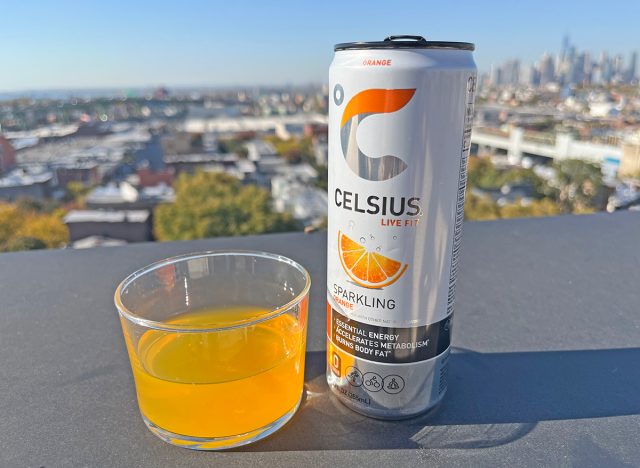
Calories: 10
Fat: 0 g
Sodium: 5 mg
Carbs: 0 mg
Protein: 0 g
Another fitness-focused, better-for-you brand, fast-growing Celsius started in Sweden and now stands as America's third top-selling energy drink after Red Bull and Monster. It comes in 27 different flavors, with Sparkling Orange among the most popular—so popular, in fact, I had to visit multiple stores to find it. Fully loaded with B vitamins and 200 milligrams of caffeine, the 12-ounce can cost me $3.50 at a local bodega.
The look: A translucent tangerine color that recalled the classic orange-flavored Gatorade, this fizzy drink beamed with sports drink vibes from the get-go.
The taste: Like a drier version of Sunkist orange soda, it's bright, crisp, and subtly citrusy with only a hint of sweetness. That restraint with the sweetener seemed to limit the artificial effect you normally get from the sucralose. Overall, this refreshing drink offered the most well-balanced sip of all the energy drinks I tried. Yet, there was one brand that I enjoyed even better.
Alani Nu Cherry Slush
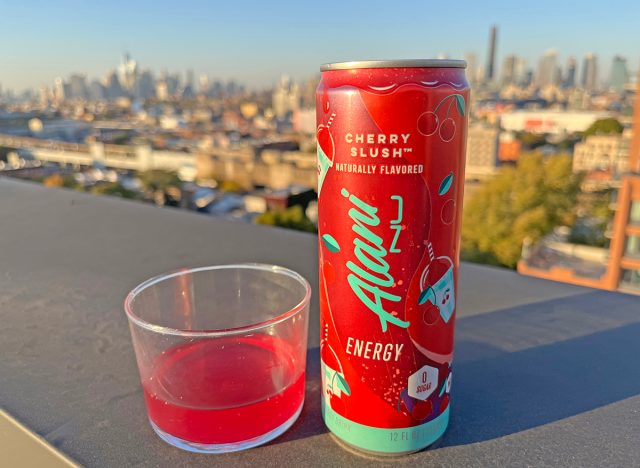
Calories: 10
Fat: 0 g
Sodium: 170 mg
Carbs: 3 g (Fiber: 0 g, Sugar: 0 g)
Protein: 0 g
Fitness influencer Katy Hearn founded this fast-growing brand in 2018, producing various "feel-good" products, including protein shakes and energy drinks. Its Cherry Slush flavor is a top-seller. Like many of its contemporaries, this drink comes loaded with B vitamins and 200 milligrams of caffeine, but it also delivers a feeling you won't get with other energy drinks. It's available in both mini-sized 8.4-ounce and full-sized 12-ounce cans. I picked up the bigger version for $2.99 at my local Walgreens.
The look: Distinct. This drink poured an eye-popping hot pink color with just the right amount of fizz.
The taste: Nostalgic. This flavor lived up to its billing—a dead ringer for the classic cherry-flavored Icee. With the first sip, I was immediately transported back to childhood, slurping my frosty treat through a big red straw while gazing up at the movie screen. It's fruity and sweet just like the popular frozen carbonated beverage, albeit much easier on the conscience with none of the sugar and only a fraction of the calories. The fizzy drink went down easy, too. Its smooth mouthfeel stood in stark contrast to the abrasive bite of other energy drinks.
From a pure enjoyment perspective, Alani's Cherry Slush was the only option that left me not just energized but excited to drink it again.
No comments:
Post a Comment